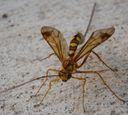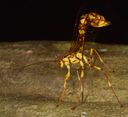Greene's Giant Ichneumonid Wasp
Megarhyssa greenei
Classification
- Phylum: Arthropoda
- Subphylum: Hexapoda
- Class: Insecta
- Order: Hymenoptera
- Superfamily: Ichneumonoidea
- Family: Ichneumonidae
- Subfamily: Rhyssinae
- Genus: Megarhyssa
- Species: greenei
Pronunciation
How to pronounce Megarhyssa greenei: /mɛɡəˈrɪsə ˈɡriːnaɪ/
These audio files are automatically generated. While they are not always 100% accurate, they are a good starting point.
Images




Summary
Megarhyssa greenei, commonly known as Greene's giant ichneumonid wasp, is a large parasitoid wasp found in the United States and Canada, identifiable by its distinct wing patterns and coloration compared to related species.
Physical Characteristics
Forewings 12-27 mm (females) and 10-16 mm (males). Females have a unpigmented clear forewing along the basal vein, with a single black spot present, and a shorter ovipositor. Males have entirely clear wings with red and yellow mesopleuron and red hind femur.
Identification Tips
Females can be identified by the clear forewing and shorter ovipositor compared to Megarhyssa macrurus. Males have completely clear wings and distinctive red and yellow markings.
Habitat
Prefers habitats where Tremex columba larvae can be found, often associated with wooded areas.
Distribution
Widespread in the eastern United States; also present in Canada.
Diet
Parasitoid of Tremex columba larvae (pigeon horntail).
Life Cycle
After female lays an egg on or near the larva, the Megarhyssa larva devours the host, then pupates under the bark of trees before emerging as an adult.
Reproduction
Females lay eggs close to or directly on the host (Tremex columba) larvae.
Ecosystem Role
Acts as a parasitoid, regulating the population of its host, Tremex columba.
Collecting Methods
- Netting in habitats where host larvae are likely to be found.
Preservation Methods
- Pinning specimens
- Alcohol preservation for soft-bodied parts.
Similar Taxa
Tags
- ichneumonid wasp
- Megarhyssa greenei
- Greene's giant ichneumonid